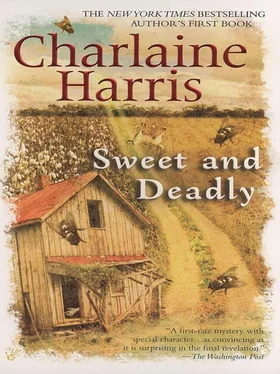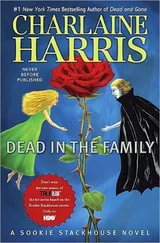The baby’s wails were reaching a crescendo of pique.
“Chrissy, hush!” Sally said faintly. “Bob, pick her up!” Sally’s voice grew louder. “Oh, Catherine, I better go, but you come see me real soon. I mean it, now!”
“Sure will. Tell Bob I said hello,” and Catherine hung up.
She absently noted that the top of the table was smeared. Her fingernails tapped along the glass as she considered what Sally had said. So Martin Barnes had lied to his daughter. He had said he had been out riding his place. Well, that was possible; every planter rode his acres, looking and assessing. But he had been near the shack where Leona’s body was lying. And Catherine had the impression that Mr. Barnes had not been driving from the direction of the shack but had pulled out from one of the houses by the highway. She tried to recall exactly what she had seen. No: she couldn’t picture precisely where the truck had been before she passed it.
Catherine shook her head. It was a stupid lie that Martin Barnes was telling. She could see no reason for it; he should have known she would report seeing him. Mr. Barnes was a good planter, but definitely not the smartest of men.
Maybe he was the guilty one. If he was not the guilty man…her mouth twisted. This was loathe-some. She wanted someone to be proved guilty; fast, so no more suspicion would be attached to her. But she couldn’t bear the certain knowledge that the murderer was someone she knew, someone whose face formed a part of her life. She had always known that, but she had never been able to accept it. She couldn’t think of anyone in Lowfield she imagined capable of beating a woman to death. Or of loosening an essential part in the car of the town’s best-known and most-loved doctor and his wife.
Could it be that Lowfield contained two murderers? That the deaths of her parents and Leona were not related? Sheriff Galton clearly believed the crimes were separate.
A familiar tension, resulting from the suspense of watching and waiting, caused Catherine’s muscles to tighten. She simply couldn’t picture someone she knew plotting the horrible death Glenn and Rachel Linton had suffered.
Her hand came down flat and hard on the glass.
It left a print, and she retreated into wondering for the hundredth time why her mother had bought a glass-topped table. Catherine had gotten out the glass cleaner and a rag, turning with relief to the mundane little task, when she remembered telling Galton she was a rich woman. She shook her head again.
That was something you just didn’t say.
The doorbell rang as Catherine was twisting her neck to look through a shaft of sun, checking to see if she had gotten all the marks off the table.
Does everyone in town want to talk to me? she wondered crossly. For a well-known recluse, I’m having lots of company these days.
Molly Perkins, the coroner’s wife, was standing with a casserole dish clutched in her hands when Catherine opened the door. Catherine had automatically looked up, and she had to adjust her sights down to meet Miss Molly’s washed-blue eyes.
Miss Molly began instantly. “I am so sorry you had such a horrible experience. I know you’re upset. I won’t stay but a minute, I just wanted to run this over to you. I knew you wouldn’t feel like cooking.”
Food, the southern offering on the altar of crisis. Catherine was bemused by its presentation now. Finding a corpse must be close enough to death in the family to qualify.
“Thanks,” she said faintly. “Please come in.”
“Well, like I say, I won’t stay but a minute. I know you must be busy with company coming by and all.”
The plump little woman was trotting through the living room back to the kitchen.
“Company?” Catherine asked the air behind her.
But Mrs. Perkins apparently didn’t hear her.
Molly Perkins’s whole body tilted forward when she walked, giving her the effect of charging eagerly forward at life. Her enormous bosom made her appear in danger of falling flat on her face at any moment, which had added a pleasant suspense to her company when Catherine was younger.
Placing the casserole on the kitchen counter, Mrs. Perkins earnestly continued, “I do hope you like gumbo. All these years up here, and I still cook Cajun. I always fix too much for Carl and myself. I just got used to cooking a lot while Josh was growing up. Can’t change my habits now he’s married and gone, I guess.”
“Thank you,” Catherine said again, determined to get a word in somewhere. “And how is Josh?”
“We got a phone call from him and his wife Friday,” said Miss Molly happily. “They’re expecting. Carl is so excited. About that, and Josh is doing well in L.A.”
“I know Mr. Perkins is proud of him,” Catherine murmured. Her conversation with Perkins at the tenant shack was the only one she could remember that didn’t feature Josh: his job, his wife (beautiful and of good family), and his brilliant prospects.
“I do wish they were settled here,” Mrs. Perkins said wistfully. “That’s why we built that big house. Not many young people do stay in Lowfield, seems like.”
Catherine slid the gumbo dish back against the wall. She couldn’t think of anything to say. As she remembered Josh, who was a few years older, the last thing he’d do would be to settle down quietly in Lowfield.
“I thought I saw a police car here this morning. I hope you haven’t had any trouble?” asked Molly Perkins with a forced air of casualness.
So that was the “company”; that was the purpose of this visit. The food, Catherine thought quickly, was an excuse to unearth interesting facts to relate at the beauty parlor.
“No,” said Catherine calmly. “No trouble.”
Against the stone wall of Catherine’s face, the little woman was visibly stymied.
“I guess Jimmy Galton has been mighty busy,” she said nervously.
“I imagine,” said Catherine.
The ensuing silence lasted a moment too long to be comfortable. Damned if I’ll break it, Catherine thought.
“Well, I’ve got to be getting back; I hope you enjoy that gumbo.”
And Mrs. Perkins trotted top-heavily to the front door, with Catherine again trailing behind.
“I got a post card from the Drummonds,” Mrs. Perkins said abruptly.
“Oh?”
“They’re in Florence, Italy. They’ll be back in another week,” Mrs. Perkins offered. “They’re having a wonderful time, they say.”
Catherine nodded.
“Well, I hope you enjoy the gumbo,” Mrs. Perkins repeated desperately.
“I’m sure I will.” She noticed that Molly Perkins did not offer the quick hug and kiss that was customary on food-bringing visits.
“Can’t let all your air conditioning run out the door!” Mrs. Perkins concluded with artificial gaiety.
And off she trotted with an anxious backward glance at Catherine, who remained in the doorway with her arms folded across her chest until the woman had gotten down the walkway and turned right to cross the street to her own house.
When Miss Molly had entered the mansion’s front door, Catherine slammed her own violently. “Talk talk talk,” she muttered. Miss Molly had come to spy and pry, to report on Catherine’s mental state and demeanor. And yet Catherine knew the pigeon-breasted little lady had also been genuinely worried about her well-being.
The phone rang as Catherine stood in the middle of the living room brooding over this duality in small-town life. She was bitterly sure the caller was not Randall: How could it be? That was who she wanted to talk to. She decided it was another sympathy call from some high school classmate she hadn’t seen in years.
The irritating sound served to trigger the anger Galton and Molly Perkins had generated. Catherine said something that undoubtedly shocked the very curtains in her mother’s living room. She had never in her life been able to take a telephone off the hook. The alternative was to leave the telephone. Catherine marched out her back door and across the lawn to Tom’s house.
Читать дальше












